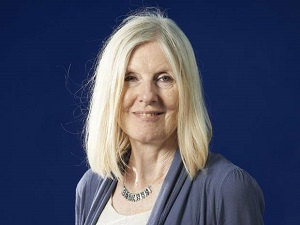De Britse dichteres en schrijfster Helen Dunmore werd geboren op 12 december 1952 in Beverley, Yorkshire. Zij was het tweede kind van haar ouders en volgde de school in Nottingham. In haar romans behandelde ze herhaaldelijk de psychologie van interpersoonlijke relaties, vooral in crisissituaties. Helen Dunmore studeerde Engels aan de Universiteit van York en doceerde twee jaar in Finland voordat ze haar eerste roman publiceerde. Naast het schrijven, bleef ze lesgeven en schreef zij ook recensies voor The Times en de Observer. Zij werkte ook mee aan programma’s over kunst op radio BBC. Dunmore won de eerste Orange Prize for Fiction in 1996 “A Spell of Winter”. In 2001 was ze genomineerd voor de Orange Prize for Fiction en de shortlist voor de Whitbread Book Award met “The Siege”. Haar boek “The Betrayal” stond op de longlist van de Booker Prize 2010. Helen Dunmore zat in de jury voor zowel de T. S. Eliot-prijs als de Whitbread Book Award en was lid van de Royal Society of Literature. In maart 2017 had ze publiekelijk aangekondigd dat ze aan kanker leed en een lage kans op genezing had. Op 25 april 2017 schreef ze haar laatste gedicht, dat ze naar haar uitgever stuurde. In het gedicht met de titel “Hold out your arms”, spreekt zij rechtstreeks tot de dood.
Uit: A Spell of Winter
‘I saw an arm fall off a man once,’ said Kate. She turned the toasting-fork to see how the muffin was browning, then held it up to the fire again. We stared at her.
‘Yes,’ she went on, ‘it was in my grandfather’s house in Dublin. They were bringing my uncle Joseph down the stairs. Narrow, twisty stairs they put in houses where they’d given no thought to the living or the dead. You couldn’t get a coffin up them. But my grandmother had kept the body too long in the house. She was mad with grief, she didn’t want him to go. She kept putting more flowers in the room, shovelling flowers in on top of him to hide the smell. Then she’d be sitting with him all night long.’
‘Was that your grandmother O’Neill?’ I whispered to the flames.
‘Who else would it be? You know my daddy was the eldest of the twelve. But this one, Joseph, was his next brother and the favourite. If there was meat or meal, it would be Joseph got the meat.’
‘Did you know him before he was dead?’
‘Who’s telling this story? He was twenty-six when he died with a kick from a cart horse. How could I not know my own uncle?
‘Well now, Joseph must have been up there a week or more, with my grandmother lighting fresh candles round him and saying prayers enough to wear out the saints. No one else’s prayers were good enough for Joseph, only hers. I remember the talk in the house. We were giving scandal. It was the middle of summer, and hot. My mother wouldn’t go near the house in her condition, and the smell had driven everyone but my grandmother from the room. That was when it was decided that they would force her to have him brought down and taken out of the house for burial. She wouldn’t even see the priest, so it was my father had to go up and talk to her. But she wouldn’t listen. In the end four of them had to take her by the ankles and elbows, kicking and screaming to wake the dead. They shut her in the scullery until it was done.’
‘Did they lock her in?’
‘There was no lock on the door. My aunts sat in with her and there were two men set to guard it so she couldn’t burst out. But the noise she made was terrible. So it was left to my father to bring Joseph down, with only Dodie to help. That was his next brother after Joseph.’
We nodded. We knew about Dodie, who never held a job or went out of the house if he could help it.”

Helen Dunmore (12 december 1952 – 5 juni 2017)
